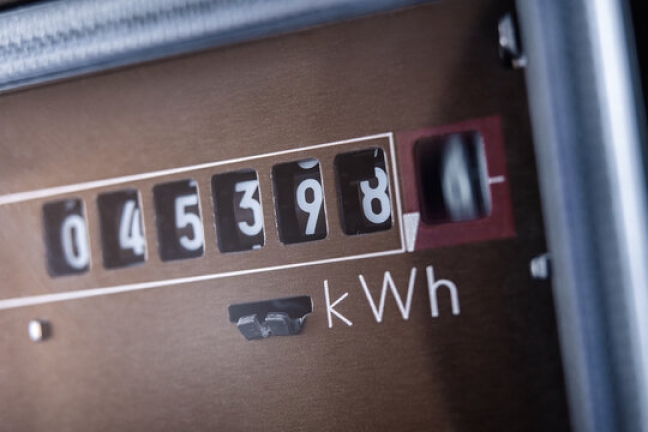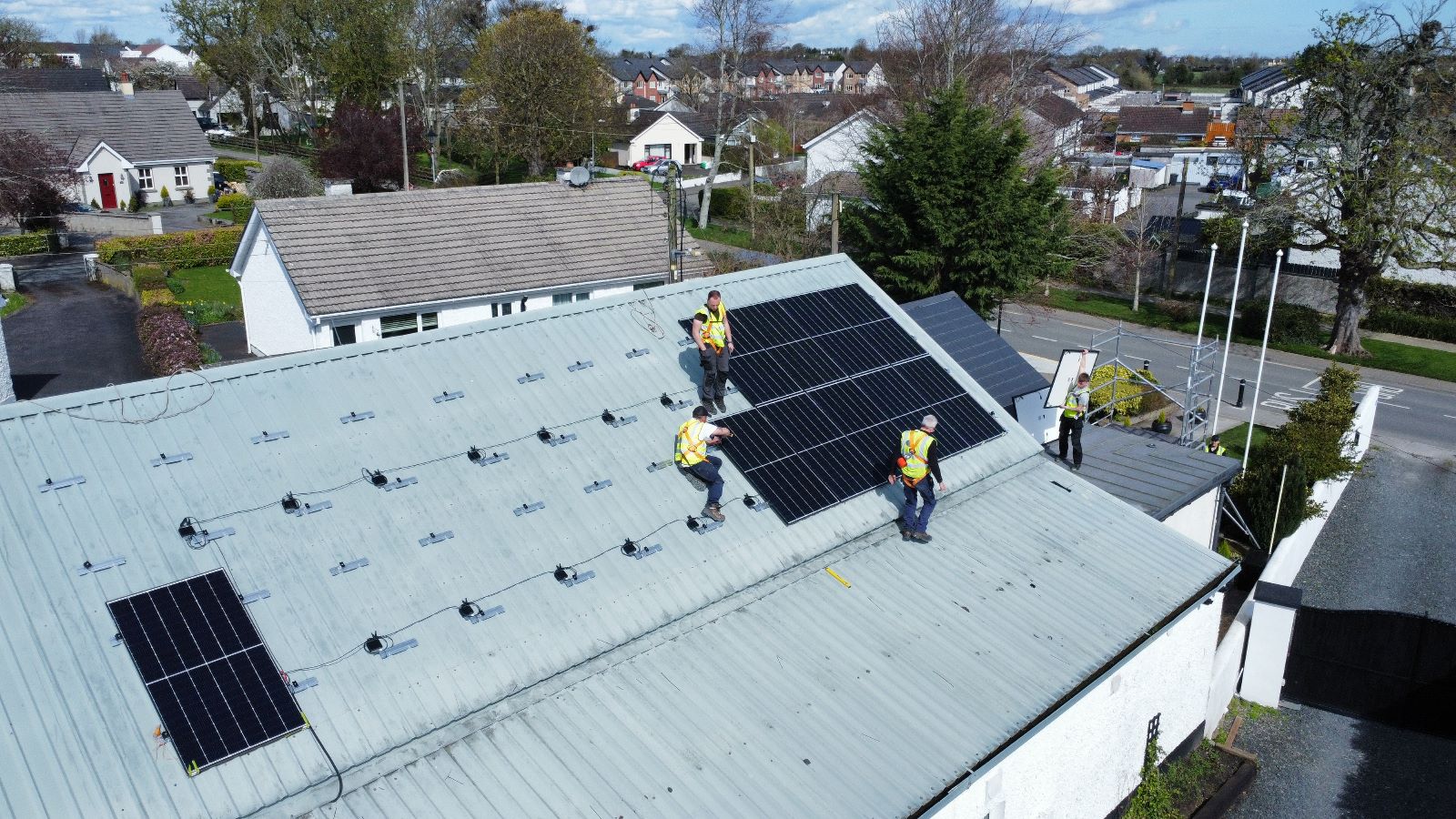Commercial Solar Panels Ireland
Recently Completed Commercial Projects
The Use Of Commercial Solar PV Systems In Ireland
Commercial solar panels are photovoltaic panels that are designed for use in commercial settings such as office buildings, factories, and warehouses. These panels are made up of multiple solar cells, which convert sunlight into direct current (DC) electricity.
The electricity generated by these panels can be used to power the building, or be fed into the electrical grid to offset energy costs. Commercial solar panels are typically larger and more durable than residential solar panels, as they need to withstand harsh weather conditions and have a longer lifespan.
The efficiency of commercial solar panels varies, depending on the manufacturer and model, but they generally range from 15% to 20%. Higher-efficiency panels are more expensive, but they can produce more electricity per square meter of the panel area.
When considering commercial solar panels, it’s important to take into account factors such as the size and orientation of the building, the amount of sunlight the panels will receive, and the available roof or ground space for panel installation. Additionally, it’s important to work with a reputable solar panel installer, to ensure that the panels are installed correctly and safely.
All in all, commercial solar panels are a cost-effective and environmentally-friendly way for businesses to generate their own electricity and reduce their carbon footprint.

Get A Free Quote Today
How Can Using A Commercial Solar PV System Save Money For Your Business?
There are many ways that installing commercial solar panels can help your business to cut down on your energy bills. Renewable energy is a cheaper investment for future energy supply, and solar electricity is an ongoing, renewable source of energy in Ireland. Choosing solar can benefit your business through savings, grants and low maintenance costs. Here are the leading ways in which switching to solar PV panels as your commercial energy source can benefit your budget;
Reduced Energy Bills:
By generating your own electricity with solar panels, you can significantly reduce your reliance on grid electricity and therefore lower your energy bills. This is particularly beneficial in Ireland, where electricity prices are among the highest in Europe.


Government Incentives:
The Irish government offers several incentives to encourage businesses to invest in renewable energy and power, including solar panels. These incentives include grants, tax credits, and accelerated capital allowances, which can help offset the cost of installing solar panels for your business. One such incentive is called the energy communities grant, which supports commercial buildings to install commercial solar PV systems. These incentives are also available and supported by certain bodies such as the Irish Solar Energy Association and The Sustainable Energy Authority of Ireland. Another incentive is the Accelerated Capital Allowance. Under the ACA scheme, businesses can claim 100% of the cost of eligible energy-efficient equipment as a tax deduction in the year of purchase, rather than over a number of years as with normal depreciation. This means that businesses can get a significant tax break on the cost of the equipment, making it more affordable and financially attractive to invest in renewable energy.
Increased Property Value:
Commercial properties with solar energy panels installed are typically more attractive to tenants and buyers, as they offer lower energy costs and a reduced carbon footprint. This can increase the value of your property by harbouring better energy communities and help you secure higher rental rates or sale prices, making solar energy installation a worthwhile investment for both your business and other organisations.


Long-Term Savings:
Solar panels have a lifespan of around 25-30 years and require minimal maintenance after installation, meaning that they can generate electricity for your business for decades with little additional cost. This long-term savings potential can provide significant financial benefits to your business over time.
Things To Consider Before Installing Commercial Solar Panels
As with any structural or energy alterations that you decide to make to either your home or your commercial building, there are some factors to be considered. The Installation of a commercial system is a big step, and it is important to have considered all the necessary factors before proceeding with the installation.
Before you proceed, consider the following:
Reduced Energy Bills:
By generating your own electricity with solar panels, you can significantly reduce your reliance on grid electricity and therefore lower your energy bills. This is particularly beneficial in Ireland, where electricity prices are among the highest in Europe.
Government Incentives:
The Irish government offers several incentives to encourage businesses to invest in renewable energy and power, including solar panels. These incentives include grants, tax credits, and accelerated capital allowances, which can help offset the cost of installing solar panels for your business. One such incentive is called the energy communities grant, which supports commercial buildings to install commercial solar PV systems. These incentives are also available and supported by certain bodies such as the Irish Solar Energy Association and The Sustainable Energy Authority of Ireland. Another incentive is the Accelerated Capital Allowance. Under the ACA scheme, businesses can claim 100% of the cost of eligible energy-efficient equipment as a tax deduction in the year of purchase, rather than over a number of years as with normal depreciation. This means that businesses can get a significant tax break on the cost of the equipment, making it more affordable and financially attractive to invest in renewable energy.
Increased Property Value:
Commercial properties with solar energy panels installed are typically more attractive to tenants and buyers, as they offer lower energy costs and a reduced carbon footprint. This can increase the value of your property by harbouring better energy communities and help you secure higher rental rates or sale prices, making solar energy installation a worthwhile investment for both your business and other organisations.
Long-Term Savings:
Solar panels have a lifespan of around 25-30 years and require minimal maintenance after installation, meaning that they can generate electricity for your business for decades with little additional cost. This long-term savings potential can provide significant financial benefits to your business over time.
Things To Consider Before Installing Commercial Solar Panels
As with any structural or energy alterations that you decide to make to either your home or your commercial building, there are some factors to be considered. The Installation of a commercial system is a big step, and it is important to have considered all the necessary factors before proceeding with the installation.
Before you proceed, consider the following:
Site Assessment:
It’s important to conduct a site assessment to determine if the building is suitable for solar panel installation. Factors to consider include roof orientation, shading, and available roof or ground space for panel installation.
Energy Consumption:
Businesses should also evaluate their energy consumption patterns to determine how much electricity they need to generate from the solar panels. This information can help determine the size and number of solar panels needed.
Planning Permission:
In Ireland, planning permission is required for solar panel installations in certain circumstances, such as for buildings in conservation areas or on protected structures. Businesses should check with their local planning authority to determine if planning permission is required.
Maintenance:
Solar panels require minimal maintenance, but regular cleaning and inspection are necessary to ensure optimal performance.
Grid Connection:
To connect solar panels to the electrical grid, businesses must obtain a grid connection agreement from their electricity supplier. This process can take several weeks or months and may incur additional costs.


